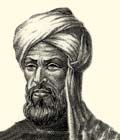
Al-Khwarizmi, Abu Jafar Muhammad ibn Musa (780 - 850)
Few details are known about his life. Even his place of birth is a matter of controversy, although most authors claim that he was born in Khwarizm (present-day Khiva), a Persian province, south of the Aral Sea.
Around the year 820, he wrote an arithmetic treatise, based on Hindu and Greek sources, explaining the Hindu system of numeration, which included the number zero. When his work was translated into Latin, Fibonacci spread the Hindu-Arabic system of numeration across Europe.
He also authored a work explaining how to solve equations and problems that come up in everyday life. The title of this work was Hisab aljabr w’almuqabala (The Compendius Book on Calculation by Completion and Balancing), which was translated into Latin when it reached the Iberian Peninsula in the 12th century.
The book was distributed across Europe under its new title, Algebra et Almucabala. Consequently, the mathematical discipline concerned with equations became known as algebra. Successive copies and translations of the book by Muhammad ibn Musa ended up equating the author’s birthplace with his name (Al-Khwarizmi means “born in Khwarizm”).
The Salem Codex, for example, begins as follows: Incipit liber algorithmi: omnis sapientia sive scienta a domine Deo (Here begins the book of the algorithmus: All wisdom and knowledge comes from God our Lord). Over time, the word algorithm has come not only to identify the methods for solving equations devised by ibn Musa, but now also refers to any list of steps, which, carried out in the proper order, can solve a problem.
